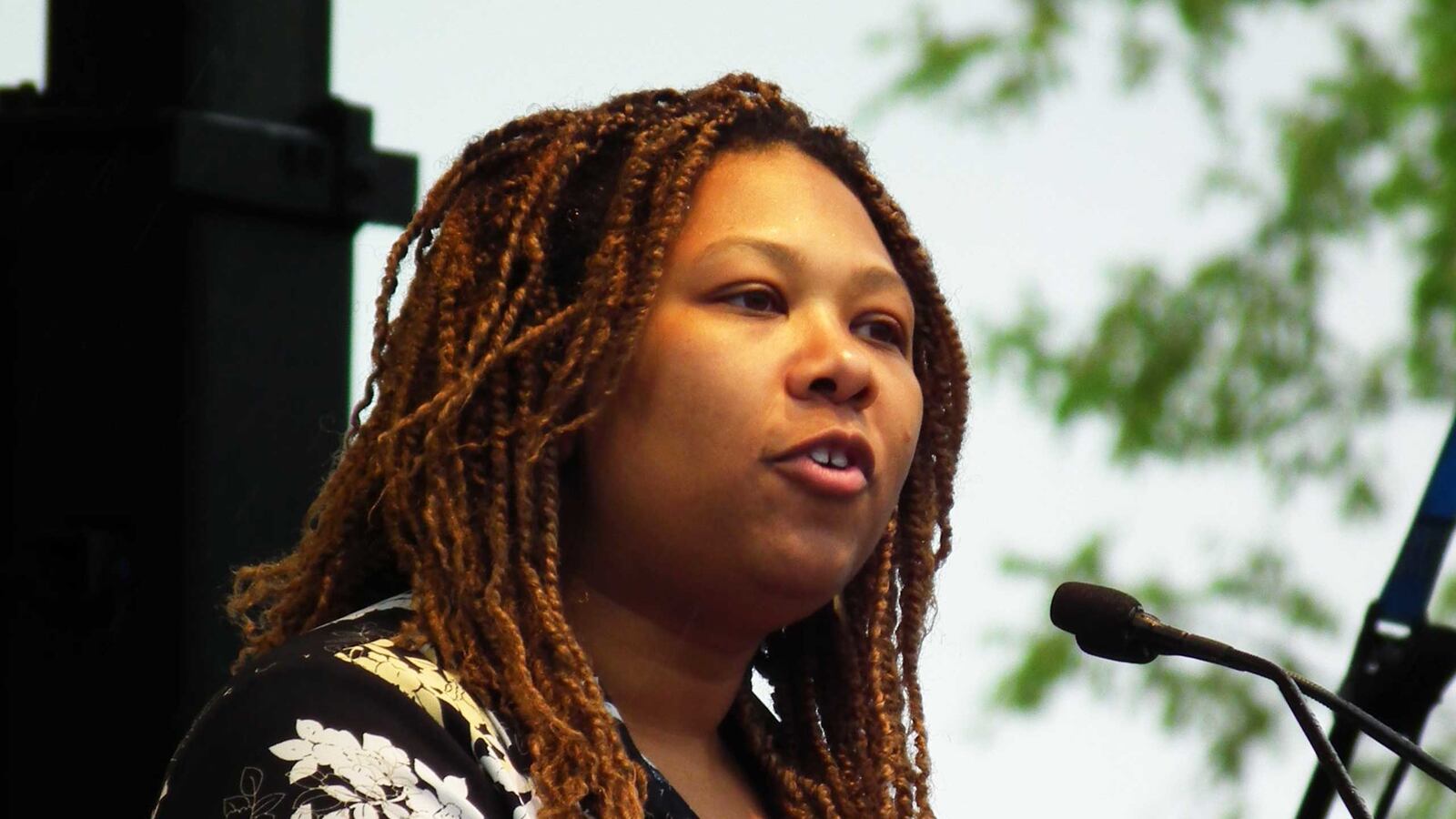It wasn’t a coveted time slot, but Jamila Bey was happy to have it. It was Day Two of the Conservative Political Action Conference, and she been allotted a small window in the early afternoon to address the assembled politicos at the conservative schmoozefest in Maryland. Bey is on the board of the group American Atheists, an advocacy group “fighting for the civil liberties of atheists and the total, absolute separation of government and religion.” It was born in 1959, out of the court case Murray v. Curlett, which challenged prayer in public schools.
It doesn’t seem like a faction that would be particularly welcome at CPAC’s shindig, or, indeed, in the Republican Party. Until Thursday, they weren’t.
On Feb. 24, 2014, a spokesman for the group told CNN that American Atheists would have a booth at CPAC 2014 in an effort to bring conservative atheists “out of the closet.” But the next day, Mediaite reported that they had been pulled from the event, with CPAC organizer Meghan Snyder explaining that “American Atheists misrepresented itself about their willingness to engage in positive dialogue.”
While it seems incredible that the CPAC organizers could mistake the aims of the group, considering its name, it surprised few at the time that it would not feature in a conservative event—and with good reason.
To begin with, American evangelical Christians—who make up 18 percent of Americans but 36 percent of Republicans—have a very frosty view of atheists. The evangelical section of the GOP base exercises considerable power, especially in the tone and messaging at an event like CPAC. But the issue is broader.
A May 2014 Pew Research poll asked respondents to rate the desirability of certain traits in a presidential candidate. Their responses indicated whether a trait made them more likely to vote for a candidate, less likely, or it wouldn’t matter. Fifty-three percent of respondents said they would be less likely to support a candidate if they were atheist, a metric worse than for a hypothetical candidate who had never held elected office, had an extramarital affair, or was gay.
This actually constituted a mellowing of the sentiment toward atheists. A 2007 poll showed that more than 6 in 10 Americans were less likely to support a nonbeliever. In June 2012, respondents to a Gallup poll were more likely to support a Muslim, a gay or lesbian, a Mormon, or someone of any race or Judeo-Christian denomination.
The modest uptick in atheist presidential fortunes coincides with a growth in the country’s atheist population, from 1.6 percent to 2.4 percent from 2007 to 2012. The percentage of religiously unaffiliated has also grown to around 20 percent of the population.
The trend toward secularization is especially prevalent among Millennials, an idea that Bey seized on in her CPAC speech: “As of the last census, we have about 68 million Millennial voters, about the age of 18 to 34. Of these 68 million, nearly 40 percent identify as secular.” The future, she was arguing, was with a group of people in whose lives religion plays an increasingly diminished role.
Bey might have expected a less than enthusiastic reception, but her speech was greeted with (very tiny) smatterings of applause and virtually no howling or booing, perhaps because the room was nearly empty. There’s a reason that time slot went to the godless heathens.
Nevertheless, the very notion that she was invited to speak represents progress, first and foremost because of the daunting numbers cited above. Beyond that, there has never been a non-Christian, much less completely unaffiliated, president. No one in the 114th Congress identifies as an atheist, and just one is unaffiliated.
In addition, those evangelical Christians with such a dim view of the non-religious essentially call the shots in modern movement conservatism. As Frank Bruni illustrates, they make up a third of the Republican base but essentially determine GOP policy. Support for gay marriage and access to abortion runs about even, and immigration reform enjoys strong support, among non-evangelical Republicans, while white evangelical Republicans are strongly against all three. The GOP platform is against all three—strongly.
And yet, there was Bey, perched at the podium at CPAC talking about the value of conservative secularists. There are atheist libertarians and unaffiliated fiscal conservatives with, in her words, “no place to call home.” She was looking to find them one in the party of George H.W. Bush, who once opined: “I don’t know that atheists should be regarded as citizens, nor should they be regarded as patriotic. This is one nation under God.”
Most atheists align with the Democratic Party, precisely because the religious right exercises such power over the GOP ticket. But nonbelievers have no representation in Congress, and receive little or no recognition politically beyond the odd Barack Obama State of the Union call out. He has referenced protections for those “who don’t believe,” but no president has ever used the word “atheist” in the address to Congress (Obama was the first to use “lesbian,” “bisexual,” and “transgender”).
Liberals have fought to keep religion—namely Christianity and its symbols—out of government and public institutions, but maintaining the separation of church and state is not an atheist battle but a democratic one. Religious non-belief is essentially an unrecognized phenomenon in presidential campaigns, which are often littered with instances of candidates from both parties trying to out-Christian each other to no productive end.
Atheists are perhaps the most politically underrepresented group in America, but they, along with the larger umbrella of the unaffiliated, are a growing constituency. Will they find a home in the GOP’s mythical Big Tent? Will the Democrats make a concerted effort to reach out to them, rather than sit by and watch—as they normally do—while the ACLU tries to keep statues of the Ten Commandments out of courthouses?
Bey was the first atheist to knock on the GOP’s door, but so far no one is listening. The Kirk Cameron movie is on the TV, and the volume’s turned up high.






